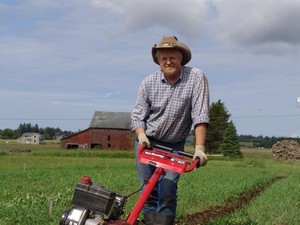08 Dec Tue 2009
Quasi-biodiversity in Bordeaux
My base paradigm is "beyond organic." This means organic methods and and a lowered carbon footprint. As such, there is an absolute component (organic methods) and a relative component (lowering my carbon footprint relative to other organic farmers). Per the organic methods, I feel it is necessary to be completely organic in order to maximize ecological interactions. In other words, there is a complex interaction between pests and predators that you give up even if you use one nonorganic method. Another way to put it is that selective interference in the overall biodiversity may have a ripple effect in the mini-ecosystem from which I harvest my crops. This is not a view shared by mainstream farmers and I even see deviations from some organic farmers in the forums on this site. You could even frame this into holistic vs. reductionist paradigms. I don't buy into the idea of a middle road, BUT for a full look at a "middle road" on organics, here is a link to what some vintners are doing in Bordeaux, France.
http://www.independent.co.uk/environment/bordeaux-banks-on-biodiversity-1835337.html
"In Saint Emilion, vineyard land sells for between one and three million euros per hectare, so when we let grass or poppies grow, it seems incomprehensible," said Xavier David-Beaulieu, owner of Chateau Coutet, a 14-hectare estate with one hectare of woods and prairie.
Obviously, there is a cost to encourage biodiversity so that natural pests and predators can interact. The usual way to go organic is either to start with fallow ground (as I did) or spend the three years letting the mini-ecosytem clean itself out and return to balance. However, this article talks about a "third way."
Hateau, like Bardet and many other Bordeaux vintners, eschews organic and biodynamic farming.
"We are on the third path - we take the best of the 'lutte raisonnée' (moderate use of pesticides), the best of biodynamic and the best of organic viticulture," said Hateau. "This is sustainable viticulture, and in my opinion, the only sustainable future.
He believes biodiversity will give him a competitive edge in terms that will resonate with fellow vintners.
"From the point when you limit your chemical interventions, you will reinforce the identity of your terroir. We are trying to free our terroir to express its complexity. People can share consultants, copy our methods, but no one can copy our terroir. It's the one thing that cannot be copied."
The most interesting part of this article for me was the focus on preserving terroir. Terroir is the complexity, the flavor, the soul, of the soil that comes through in the wine. It is the flavor of the mini-ecosytem. Since the vintner quoted above has identified biodiversity as necessary for preserving the terroir, we might take this idea one step further. Is it indeed even possible to preserve terroir unless you have a total natural interaction? In other words, is this just another re-branding of half-step measures based on doing as little as possible to preserve your price premium? Or, is it truly possible to put organic methods on the same continuum as chemical agriculture and move along the continuum in small steps? My understanding of ecology and the mini-ecosystem on my own place says you cannot use half-measures. However, I will keep an open mind and see how this plays out over the years. My personal wine favorite is Bordeaux and I am well-acquainted with the St. Emilion label, so I am highly motivated to keep tabs on this development.
For another look at what is happening in France with organics, check out Food Beware: The French Organic Revolution (2008). It is about one town embracing local food sourcing for its children's school lunches and the unintended benefits.

